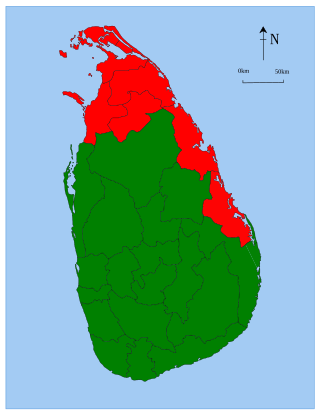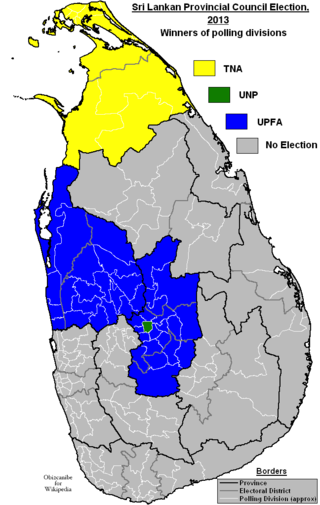| |||||
| Decades: | |||||
|---|---|---|---|---|---|
| See also: | |||||
The following lists events that happened during 1982 in Sri Lanka .
| |||||
| Decades: | |||||
|---|---|---|---|---|---|
| See also: | |||||
The following lists events that happened during 1982 in Sri Lanka .

Sri Lankabhimanya Ranasinghe Premadasa was the third President of Sri Lanka from 2 January 1989 until his assassination in 1993. He also served as Prime Minister of Sri Lanka from 6 February 1978 to 2 January 1989. This makes Premadasa the longest-serving uninterrupted Prime Minister of Sri Lanka, having served in the post for nearly 11 years. He was the first person to be conferred with Sri Lanka's highest civilian award, the Sri Lankabhimanya in 1986 by President J. R. Jayewardene.

The United National Party is a centre-right political party in Sri Lanka. The UNP has served as the country's ruling party, or as part of its governing coalition, for 38 of the country's 74 years of independence, including the periods 1947–1956, 1965–1970, 1977–1994, 2001–2004 and 2015–2019. The party also controlled the executive presidency from its formation in 1978 until 1994 and again from 2022 to 2024.

Junius Richard Jayewardene, commonly referred to by his initials JR, was a Sri Lankan lawyer, public official and statesman who served as Prime Minister of Sri Lanka from 1977 to 1978 and as the second President of Sri Lanka from 1978 to 1989. He was a leader of the nationalist movement in Ceylon and served in a variety of cabinet positions in the decades following independence. A longtime member of the United National Party, he led the party to a landslide victory in the 1977 parliamentary elections and served as prime minister for half a year before becoming the country's first executive president under an amended constitution.

Presidential elections were held in Sri Lanka for the first time on 20 October 1982. Incumbent president J. R. Jayewardene of the governing United National Party was re-elected, receiving 53% of all valid votes cast, defeating his main opponent Hector Kobbekaduwa of the Sri Lanka Freedom Party.
Vanni Electoral District is one of the 22 multi-member electoral districts of Sri Lanka created by the 1978 Constitution of Sri Lanka. The district covers the administrative districts of Mannar, Mullaitivu and Vavuniya in the Northern province. The district currently elects 6 of the 225 members of the Sri Lankan Parliament and had 253,058 registered electors in 2014. The district is Sri Lanka's Electorate Number 11.

Parliamentary elections were held in Sri Lanka on 21 July 1977. The result was a landslide victory for the United National Party, which won 140 of the 168 seats in the National State Assembly.

Presidential elections were held in Sri Lanka on 19 December 1988. Nominations were accepted on 10 November 1988. Prime Minister Ranasinghe Premadasa of the governing United National Party was elected, receiving 50.4% of all votes cast and defeating both the Sri Lanka Freedom Party candidate, former Prime Minister Sirimavo Bandaranaike, and the Sri Lanka Mahajana Pakshaya candidate, Ossie Abeygunasekera.
Ranjith Kanishka Parakrama Atapattu was a Sri Lankan physician and politician.
Ronald Joseph Godfrey de Mel was a Sri Lankan civil servant and politician. He served as the Minister of Finance under President J. R. Jayewardene's government from 1977 to 1988 and was instrumental in the establishment of the free market economy in Sri Lanka. He was also the longest serving finance minister of Sri Lanka. De Mel served as a Member of Parliament on multiple occasions, first from the Devinuwara District from 1970 to 1989, then from the Matara District from 1994 to 2000, and finally as a National list member of Parliament from 2000 to 2004. He also served as a Senior Adviser to President Mahinda Rajapaksa. Although he was a self-described socialist, de Mel has been credited with introducing capitalism and capitalist reforms to Sri Lanka's economy. He left a lasting mark on Sri Lanka's economy and political life, as recognized by national leaders at his funeral.

A referendum on extending the term of parliament by six years was held in Sri Lanka on 22 December 1982. It was the first and so far only national referendum to be held in the country. The referendum was called for by President J. R. Jayawardene, who had been elected to a fresh six-year term as President in October 1982. With the life of the current parliament due to expire in August 1983, Jayawardene faced the possibility of his ruling United National Party losing its massive supermajority in parliament if regular general elections were held. He therefore proposed a referendum to extend the life of parliament, with its constituents unchanged, thereby permitting the United National Party to maintain its supermajority.
Badulla electoral district is one of the 22 multi-member electoral districts of Sri Lanka created by the 1978 Constitution of Sri Lanka. The district is conterminous with the administrative district of Badulla in the Uva province. The district currently elects 8 of the 225 members of the Sri Lankan Parliament and had 574,814 registered electors in 2010. The district is Sri Lanka's Electorate Number 19.

Hector Senarath Rajakaruna Bandara Kobbekaduwa was a Sri Lankan politician and lawyer. He was the Sri Lanka Freedom Party candidate in the 1982 Sri Lankan presidential election and the Minister for Agriculture and Lands from 1970 to 1977. He is remembered for nationalizing privately owned land and restricting the ownership of private land to 20 hectares for the purpose of giving land to landless peasants. He created collectively owned settlement programs called Janawasas in some of the land that was acquired. He contested the 1982 presidential election and lost. The campaign of the SLFP led by him advocated for restoring previous Sri Lanka Freedom Party policies. His opponents ran an effective campaign criticising the closed economy & socialist policies of his Sri Lanka Freedom Party-led regime from 1970 to 1977; they blamed the SLFP policies for creating scarcities of essential goods and unemployment. Although the SLFP led by him lost the 1982 Sri Lankan presidential election, he managed to gain a significant number of votes in Tamil-speaking areas like Point Pedro, defeating Tamil nationalist parties.
Maha Amarasinghege Anandatissa de Alwis was a Sri Lankan journalist, marketer and politician. He was the Speaker of the National State Assembly, a Minister of State and the fourth Governor of the North Western Province of Sri Lanka. He was a member of the United National Party.

Provincial council elections were held in Sri Lanka on 21 September 2013 to elect 148 members to three of the nine provincial councils in the country. 4.4 million Sri Lankans were eligible to vote in the election. Elections to the remaining six provincial councils were not due as they had their last election in 2009 or 2012. This was the first provincial council election in the Northern Province in 25 years.
Major Theodore Frederick "Freddy" Jayewardene was a Ceylonese planter and politician. He was the Parliamentary Secretary to the Minister for Labour and Member of Parliament for Colombo South from 1948 to 1956.
The 8th Parliament of Sri Lanka was a meeting of the Parliament of Sri Lanka, with the membership determined by the results of the 1977 parliamentary election held on 21 July 1977. The parliament met for the first time on 22 July 1977 and was dissolved on 8 March 1989.
The 19th Amendment (19A) to the Constitution of Sri Lanka was passed by the 225-member Sri Lankan Parliament with 215 voting in favor, one against, one abstained and seven were absent, on 28 April 2015. The amendment envisages the dilution of many powers of Executive Presidency, which had been in force since 1978. It is the most revolutionary reform ever applied to the Constitution of Sri Lanka since JR Jayawardhane became the first Executive President of Sri Lanka in 1978.
Bernard Soysa was a Sri Lankan politician.
Arthur Edmund Samarawickrema was a Sri Lankan auctioneer, broker and politician.